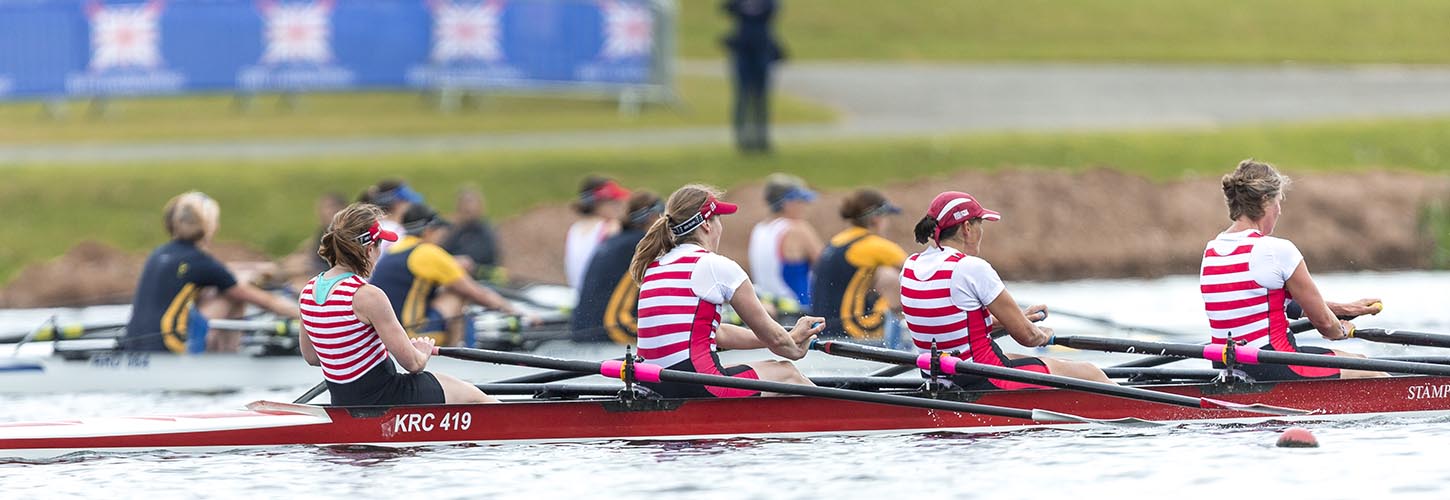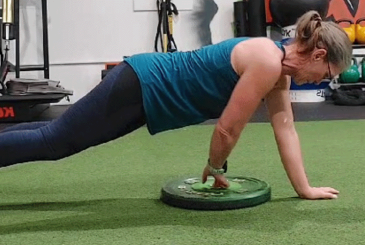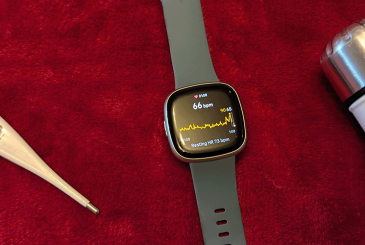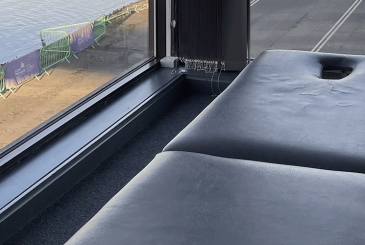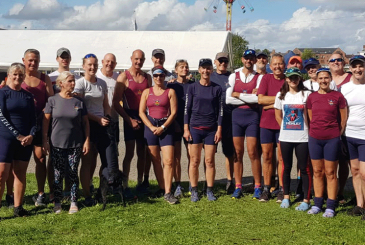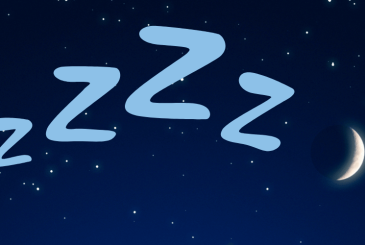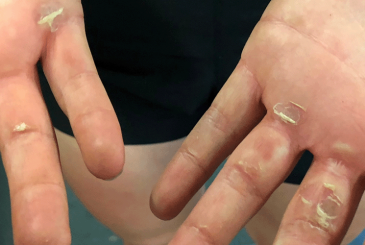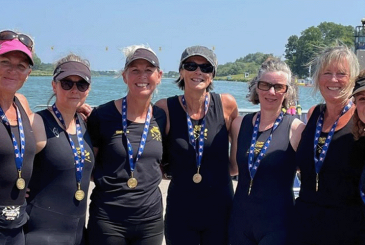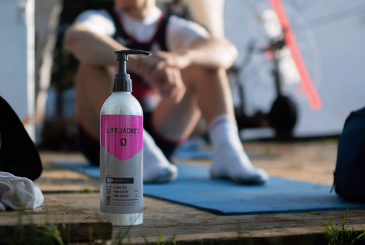‘We haven’t evolved to be post-menopausal women,’ says consultant gynaecologist and 1984 Olympic rower Kate Panter. Longer life expectancies mean that women are now outliving the span of time we were designed for, and with that come the challenges of menopause and its changes to our bodies and lives. Zoe Gullen finds out how rowing can help with these
Menopause affects the whole body and all women, but experiences vary enormously. While Kate has particular interests in sports gynaecology and menopause, and is both a member of the Medical Advisory Council of the British Menopause Society and a specialist advisor in women’s health/gynaecology to the UK Sports Institute, she stresses that what follows is general health advice rather than medical direction. This is also in line with current NICE guidance, which is not a one-size-fits all approach but rather, Kate says, ‘Care should be individualised to the woman, her symptoms, her past medical history and what she is trying to achieve.’
Note: Following British Menopause Society usage, ‘woman’ has been used to mean ‘individuals whose sex assigned at birth was female, whether they identify as female, male, or non-binary’.
Maintaining a comfortable body temperature
Hot flushes and night sweats are among the most familiar symptoms of menopause. Problems with heat regulation are caused by the narrowing of the body’s thermoneutral zone, which means the range of comfortable body temperature becomes smaller and so it’s easy to feel too hot or too cold.
Kate says, ‘One of the big things is that you should have lots of layers on your bed when you sleep, such as having a sheet and an eiderdown rather than one big 18-tog duvet,’ and advises the same in training: ‘Layer up: you will get hot and cold, so you need to be able to add or remove clothing. Take a dry bag in the boat to stow extra clothes.’
Where possible, to schedule training sessions for earlier in the day
Just as bedrooms should be well ventilated for a good night’s sleep, make sure that gyms are not too hot and have a good flow of fresh air. Kate adds that there is some evidence that exercising late in the evening can disrupt sleep in menopause, so try, where possible, to schedule training sessions for earlier in the day to allow time to wind down before bed.
Oestrogen and bones
Even if women don’t have the external symptoms of menopause, their bodies will still experience the effects of lowered oestrogen. These include reduced bone density and its attendant risk of osteoporosis.
Kate says, ‘You reach peak bone mass in your late twenties, and it’s really important that women keep menstruating.’ If periods stop early, find out why: among other factors, it could be due to RED-S (relative energy deficiency due to sport) or early menopause; a diagnosis will enable women to get help to support oestrogen levels.
Only by stressing bones do they keep strength
She adds, ‘When you hit menopause, bone mass falls quite precipitously.’ However, ‘exercise seems to be protective’. ‘To avoid osteoporosis, you need to put stress through bones and joints. Only by stressing bones do they keep strength.’
Weight training and weight-bearing activities are particularly effective, but also circuit training and running, as well as rowing as an excellent full-body exercise.
Calcium, vitamin D and a healthy diet
Calcium is also critical for strong bones, and Kate advises consuming whole-milk products where possible, in preference to tablets. Vitamin D helps the body absorb calcium, and while as an outdoor sport rowing helps the body to manufacture vitamin D by exposure to sunlight, taking a supplement in the winter will keep levels topped up.
During menopause, women can become insulin resistant, meaning their bodies are less good at dealing with sugar and carbohydrates, leading to weight gain. ‘Exercise offsets this tendency to put on weight,’ Kate says, but a balanced diet including whole grains and slow-release carbs will help to maintain a healthy weight and general good health.
Hormone Replacement Therapy
Women in midlife often have busy lives, and as Kate observes, ‘It’s not an easy time to be under par, and it’s not in the interests of women to have their lives melt down. Hormone Replacement Therapy (HRT) is not compulsory, but good help is available.’
She continues, ‘If you are in the group of women for whom the risk is low and you have bothersome symptoms, seeing a doctor about HRT can be a reasonable approach.’
Taking HRT can have knock-on lifestyle benefits – Kate likens this to how a good night’s sleep and a healthy breakfast set you up well for the day – and oestrogen ‘does act as a lubricant in the body’, helping with stiffness and aches and pains.
Training and racing
Low oestrogen has an impact on heart health, as it leads to a more masculine build-up of fat around the midsection and an increased risk of cardiovascular disease. Rowing can help counter this, as it is a good aerobic activity.
It’s about turning up rather than giving up, and training around symptoms
Also, Kate says, ‘It’s a team activity, which will mean you are more likely to comply’. There is evidence that the drive and reward from exercise can diminish during menopause, so ‘as you get older it’s good to have things to lock you into exercise – it’s in the diary and you have an obligation to your crew. It’s about turning up rather than giving up, and training around symptoms.’
Then, there are the proven mental-health benefits of exercising outdoors, and Kate points to the ‘mindfulness quality’ of rowing: ‘You have to concentrate so hard, and it is a repetitive movement.’
Both HRT and exercise can alleviate the symptoms of menopause, and to maximise the effects, both for the relief of symptoms and for performance in training progression and racing, pay attention to nutrition, hydration, rest and recovery. Make sure you do a thorough warm-up to get the most out of the session, and then cool down properly too.
Mobility, core and pelvic health
A balanced training programme is also critical: as well as aerobic and strength training, most women, as they get older, also need to work on mobility and core strength.
Baz Moffatt, a fellow GB international and now a fitness coach specialising in women’s health, says, ‘To mitigate issues, all women should be doing pelvic-floor exercises every day.’
Again, keeping active and at a healthy weight also help with good bladder and bowel control, as do having a strong back, glutes and core. Rowing is, Baz adds, ‘a brilliant sport for women, for strength and activating the back and posterior chain’.
Finding support
Baz continues, ‘The menopause is as significant as puberty, but nobody tries to fight that. The narrative has been to stay slim, stay sexy, stay as you were, but we need to move the conversation on, to look at how best to support ourselves, not punish ourselves or be disappointed.’
Rowing can be central in this, helping women to find an inclusive environment in which they can thrive, and also to become role models for younger women approaching menopause.
Kate says, ‘Trying to carry on and exercise is only going to help. Rowing is a physical thing, and it’s a good environment to share experiences of your journey. Keep in view, keep going, and get the support of other women so you don’t feel alone.’
Key points
- During menopause, the range of comfortable body temperature becomes smaller and so it’s easy to feel too hot or too cold. Layer up so you can add or remove clothing.
- Where possible, schedule training sessions for earlier in the day as there is some evidence that exercising late in the evening can disrupt sleep in menopause.
- Bone mass falls during menopause. To avoid osteoporosis, you need to put stress through bones and joints. Exercise helps with this.
- Low oestrogen leads to a build-up of fat around the midsection and an increased risk of cardiovascular disease. Women can also become insulin resistant, meaning their bodies are less good at dealing with sugar and carbohydrates, also leading to weight gain. Rowing can help counter this, as it is a good aerobic activity and because it’s a team activity, you’re more likely to turn up!
- All women should be doing pelvic-floor exercises every day.
Photo: Drew Smith.
What do YOU want to read about on British Rowing Plus?
What do you find interesting here on British Rowing Plus that you’d like more of? What haven’t we covered yet that you’d like to read about?
Let us know by emailing [email protected]


